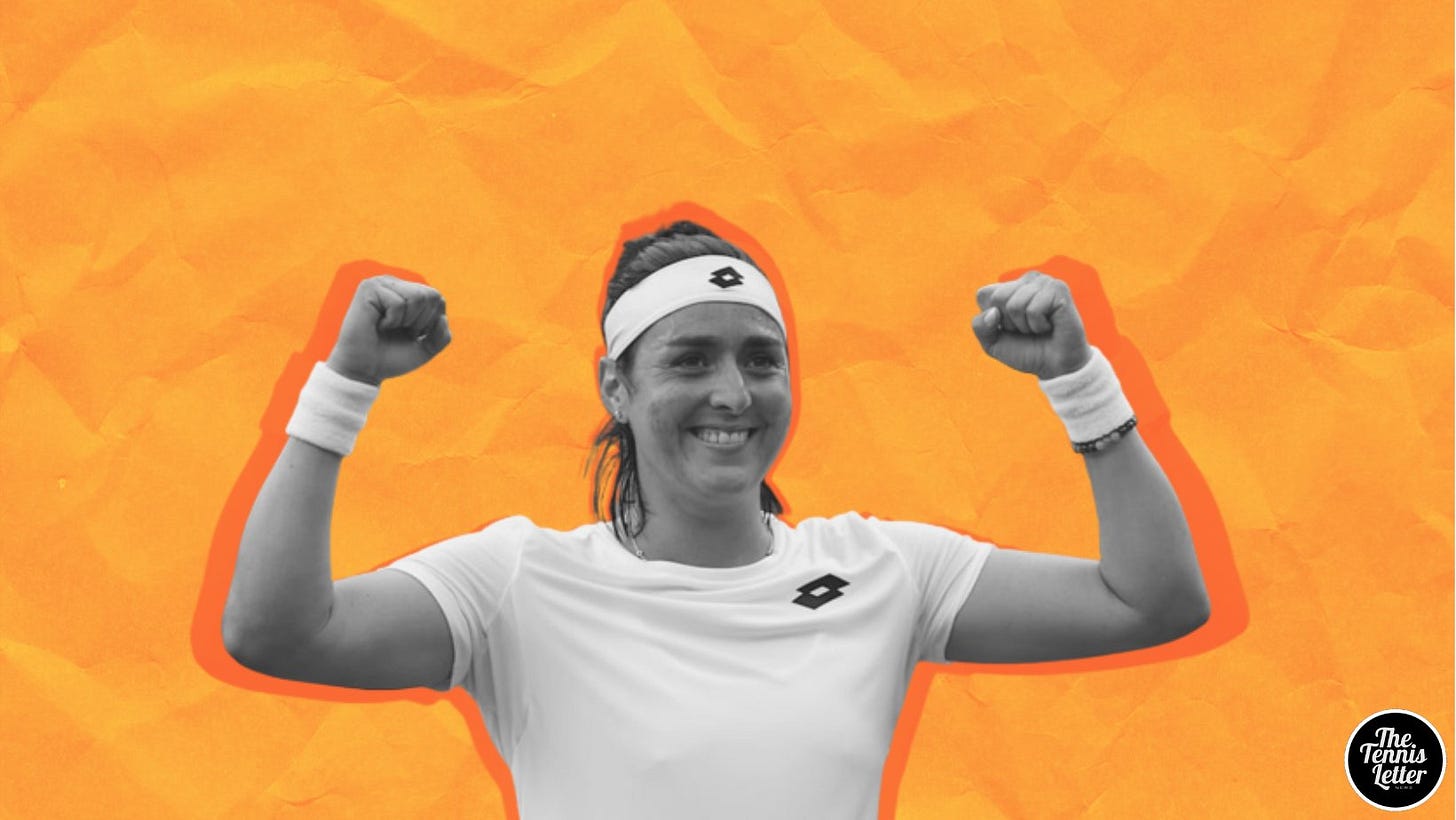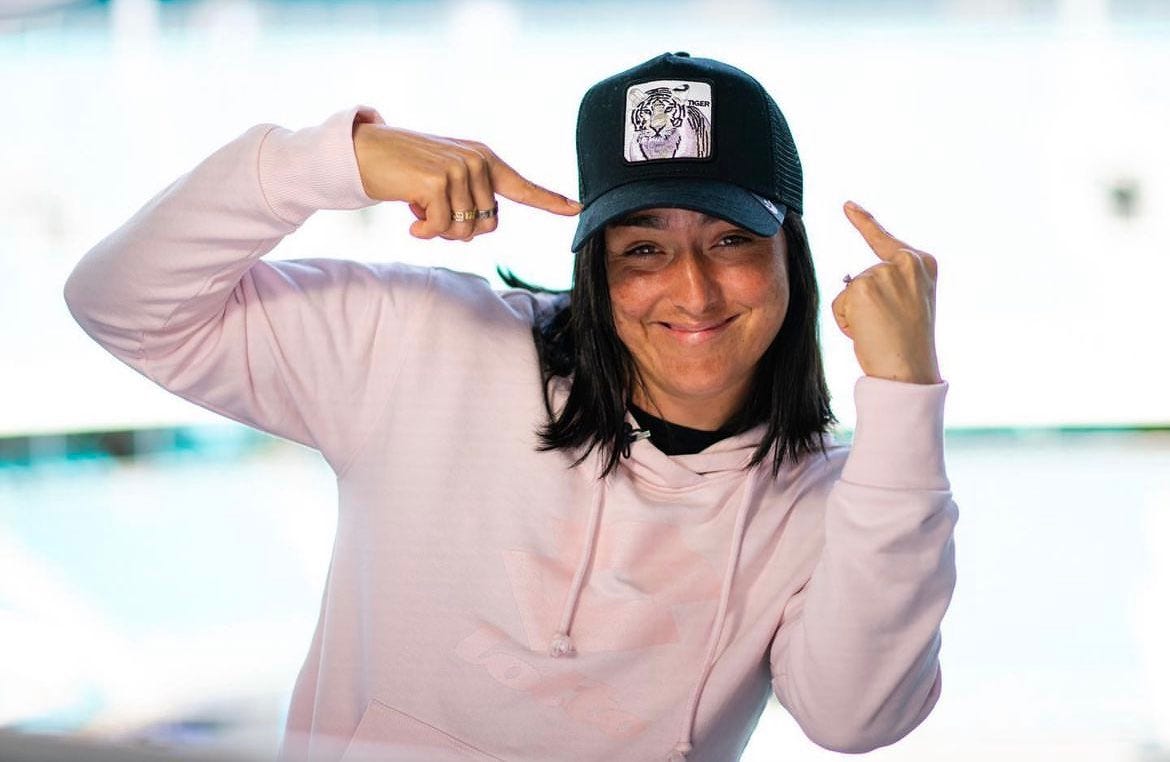Ons Jabeur: The Road Not Taken - Issue #32
Ons Jabeur has reached 2 Grand Slam Finals and a career high ranking of #2. But perhaps her greatest achievement is the legacy she's building for a generation of young Arab girls and boys.
Written by Dove Sallow
Ons Jabeur is a trailblazer, pioneer, and an inspiration to anyone who dares to dream big. Coming from Tunisia, she is the greatest African tennis player in history. Ons reached a career high ranking of world #2 and became the highest ranked Arab player of all time. Additionally, Jabeur became the first Tunisian and North African woman to ever reach a Grand Slam Final when she reached the final of Wimbledon in 2022. Trailblazing is almost too soft of a word to describe what she's doing for the Arab world and the continent of Africa. Coming from a place without deep roots in tennis, it's remarkable what the Tunisian has been able to achieve. As a young girl, she often trained at nearby hotels because her club didn't have tennis courts. It took years of sacrifice and belief to achieve all that she has. But Jabeur's dedication has been paying off. As a result, she's inspired a generation of young Arab women to find themselves in sports. Ons has put a spotlight on tennis in the Arab world that has never been seen before. But none of it would've been possible without the little girl from Tunisia, with just a dream and a racquet.
"I hope I can send a powerful message that if I made it here, everybody can make it here. Especially for women from different countries, especially from women from the Middle East, from the Arab world.”
That little girl from Tunisia grew into one of the trickiest and most naturally gifted players the WTA tour has ever known. Ons developed a game that's both artistic and unpredictable. Her touch, finesse, and tennis IQ are the foundation for her game. Jabeur is known for having the best drop shot in women's tennis. She disguises her drop shot beautifully. But what sets this shot apart is that she can hit it from almost anywhere in the court. The Tunisian is known to hit drop shot winners when returning serve and even when she's pushed behind the baseline. Jabeur also has a deadly slice backhand that has the exact same take-back preparation as her drop shot. Her opponents have no idea whether she's hitting a slice or a drop shot until the last possible second. When you factor in all of these variables, Ons' drop shot is the most flexible and well-executed drop shot in the sport. She also has a strong forehand that she likes to use to dictate play. It's a flat strike, but she's more than capable of adding some heaviness to her forehand when need be. The Tunisian isn't one of the taller players on tour, standing at 5 feet 6 inches. Because of this, her serve is mainly about placement. She's an aggressive player, but not one who tries to overpower her opponents. Jabeur plays each shot with purpose. She's constantly thinking about the next shot and always aiming to keep her opponents moving one direction or another. With all the variety she has in her game, it's no surprise that the Tunisian's game translates well to every surface. Her slices and drop shots stay incredibly low on grass courts, as we saw when she made the final of Wimbledon last year. Her groundstrokes have a great pop to them on a fast hard court, which was evident when she reached the US Open final. And on a slower surface like clay, Jabeur has just a little more time to set up and use the finesse in her game. So I have no doubt we'll see her in a Roland Garros Final at some point in the future.
Jabeur's 2022 season was world-class in every facet of the word. Obviously, Iga Świątek was a very dominant #1 last year. But Ons was definitely the 2nd best player in the world. She reached a career high ranking of world #2, became the first African player to win a WTA 1000 in Madrid, reached two Grand Slam Finals (Wimbledon and US Open), and also became the first Arab and African woman to qualify for the Year End Championships. With so many highs last year, many people were wondering what kind of form Ons would be in for 2023. Unfortunately, her season kicked off with an injury. She played her first event of the year in Adelaide, but injured herself mid-match against Linda Nosková. Despite the injury, Ons gave it her best effort in Australia, where she lost in the second round to Markéta Vondroušová (6-1, 5-7, 6-1). Markéta played a great match, but Jabeur wasn't herself. Her movement was stifled and her shot selection was off. She was spraying errors and looked uncomfortable. But as usual, Jabeur played her heart out and fought til the end. Shortly after, Ons announced she would need to undergo minor knee surgery. The Tunisian made her return in Miami, but still didn't look to be at 100%, as she lost to Varvara Gracheva 6-2, 6-2 in the second round.
Luckily for Ons, the next stop on the tour was Charleston - one of her favorite events. When she arrived on the green clay of Charleston, Jabeur looked infinitely more comfortable than she did in Miami. Her footwork was more free and her shot selection was more assured. The Tunisian defeated Lesia Tsurenko, Caroline Dolehide, Anna Kalinskaya, and Daria Kasatkina to reach the final without dropping a set. The woman she'd face would be none other than Belinda Bencic, the same woman she lost the title to in last year's final. Jabeur got off to a rocky start, but Belinda was playing fearless tennis. She was painting the lines and attacking from every angle of the court. Ons looked flustered and found herself 3-5 down in the first set. But the crowd really rallied behind her and Ons managed to come up with magic when she needed it. She hit a front-facing tweener to get herself back in the first set and also saved two set points. That front-facing tweener was one of the best shots I've seen in years. It ended up being the spark Jabeur needed to take hold of the match and build up momentum. Once the Tunisian found her confidence, there was no going back. It was Ons' turn this time. Her face gleamed with joy. The stadium erupted for her. The Tunisian flag waved proudly in the stands.
"What’s crazy in Tunisia is, they watch soccer, it’s the national sport, and now people watch more tennis than that. You can see in cafes. They probably don’t know what the score is, but they’re still watching to encourage me and that means a lot to me."
Ons has made Tunisians and the entire Arab world stop and take notice of the road she's paving. She didn't grow up in a world where tennis was easily accessible. She had a smaller chance of making it as a tennis player, simply because of where she came from. No one from Tunisia had walked down the road she wanted to take in life, so she had to build it herself - brick by brick. Known as the Minister of Happiness, she is more than deserving of that title. Where Tunisians used to gather to watch football games, they are now gathering to watch one woman play tennis. Ons has become a beacon of hope to cling on to during hard times, but also a source of energy to know that it's possible to come from modest beginnings and have everything you want one day. It's possible to be the first to achieve something in sport and also be a woman. Jabeur is now a source of genuine joy and pride for the entire continent of Africa. She achieved dreams that so many boys and girls never felt were even possible until she made them possible. I think I speak for everyone when I say that tennis is better when Ons is at the forefront. When she walks on court, the atmosphere becomes happier. She smiles at fans and interacts with the ball kids. The air feels more open and the crowd loosens up. This is the effect that one woman with a pure heart, on a mission to inspire, can have on this world. With every drop shot she hits, people from all over unite. With every trophy she lifts, an entire continent erupts. And with every new milestone she reaches, a young Arab girl will pick up a tennis racquet.
Want to keep up with Ons Jabeur? Follow her on Instagram and Twitter.





